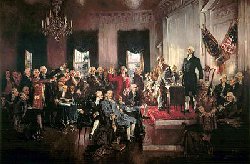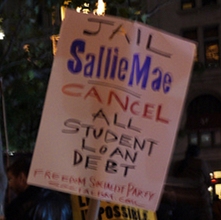 Changing the U.S. Constitution can be a rather tricky proposition. To amend it under normal circumstances requires a proposal to be deliberated and approved by at least two thirds of both chambers of Congress, a procedure familiar to most Americans. Assuming acceptance, it is sent to the various state legislatures where a minimum of 75% must approve of it for passage. However, Article V of the Constitution has a provision whereby a Constitutional Convention (aka, Article V Convention, or Amendments Convention) can be called by at least two-thirds of the states (34) whereby amendments can be drafted by a separate body of delegates, not the Congress, before being sent to the state legislatures for ratification (again, at least 75%). The scope of the convention must be very specific in terms of what it proposes to address. Although this vehicle is at our disposal, the last time such a convention was called was back in 1787 in Philadelphia. That's right, 234 years ago.
Changing the U.S. Constitution can be a rather tricky proposition. To amend it under normal circumstances requires a proposal to be deliberated and approved by at least two thirds of both chambers of Congress, a procedure familiar to most Americans. Assuming acceptance, it is sent to the various state legislatures where a minimum of 75% must approve of it for passage. However, Article V of the Constitution has a provision whereby a Constitutional Convention (aka, Article V Convention, or Amendments Convention) can be called by at least two-thirds of the states (34) whereby amendments can be drafted by a separate body of delegates, not the Congress, before being sent to the state legislatures for ratification (again, at least 75%). The scope of the convention must be very specific in terms of what it proposes to address. Although this vehicle is at our disposal, the last time such a convention was called was back in 1787 in Philadelphia. That's right, 234 years ago.
Although there have been suggestions of holding a Constitutional Convention over the years, the Congress has interceded and taken action to avoid usurping their authority. We now live in a time though where the approval rating of Congress is at an all time low, and the American public has genuine concerns about such things as curbing the influence of lobbyists, redefining the term limits and benefits of the Congress, campaign reform, and a balanced budget, to mention but a few. Taking such important matters out of the direct hands of the Congress, who the public no longer trusts, would go a long way to overcome the partisan politics in the capitol.
The question becomes, who would push for such a convention? Since the president and the Congress represents the status quo, they lack the political chutzpah to push for such a proposal. In fact, it needs to come from the states themselves, but because of the disparity between them, this too is highly unlikely. Instead, a GOP presidential candidate is the logical choice as there are no Democratic candidates. Whoever is first to propose it will be wildly embraced by the American people as a whole, not just one party, as they realize some significant changes have to be enacted in the manner by which our government operates. Think about it, it's more than just the right thing to do; it's bold, it's imaginative, and it makes the person look very presidential. Let us not forget, George Washington presided over the last Continental Congress.
Understand this, the president serves in no official capacity in enacting constitutional amendments, but the GOP nominee could force such a convention simply by creating a firestorm of public demand. Keep in mind, not only would the Tea Party like to see such a convention, their opposites, the Occupy Wall Streeters, would also be interested in such a concept. Frankly, it's a no lose proposition for the GOP nominee as the Congress and president will certainly not call for it, and the public would embrace it.
I wonder if any of the GOP candidates are smart enough to grab the brass ring. Now, if all of the GOP candidates would get behind such a proposal...Wow!
For more information, here is Article V of the Constitution:
"The Congress, whenever two thirds of both Houses shall deem it necessary, shall propose Amendments to this Constitution, or, on the Application of the Legislatures of two thirds of the several States, shall call a Convention for proposing Amendments, which, in either Case, shall be valid to all Intents and Purposes, as Part of this Constitution, when ratified by the Legislatures of three fourths of the several States or by Conventions in three fourths thereof, as the one or the other Mode of Ratification may be proposed by the Congress; Provided that no Amendment which may be made prior to the Year One thousand eight hundred and eight shall in any Manner affect the first and fourth Clauses in the Ninth Section of the first Article; and that no State, without its Consent, shall be deprived of its equal Suffrage in the Senate."
Keep the Faith!
Note: All trademarks both marked and unmarked belong to their respective companies.
 Tim Bryce is a writer and the Managing Director of M. Bryce & Associates (MBA) of Palm Harbor, Florida and has over 30 years of experience in the management consulting field. He can be reached at timb001@phmainstreet.com
Tim Bryce is a writer and the Managing Director of M. Bryce & Associates (MBA) of Palm Harbor, Florida and has over 30 years of experience in the management consulting field. He can be reached at timb001@phmainstreet.com
For Tim's columns, see:
http://www.phmainstreet.com/timbryce.htm
Like the article? TELL A FRIEND.
Tune into Tim's THE BRYCE IS RIGHT! podcast Mondays-Fridays, 7:30am (Eastern).
http://www.blogtalkradio.com/timbryce
Copyright © 2011 by Tim Bryce. All rights reserved.
 "If you are not using the right bait, you'll catch nothing." - Bryce's Law
"If you are not using the right bait, you'll catch nothing." - Bryce's Law Let's face it, cooking a Thanksgiving dinner can be quite an undertaking. Whether it is a major family function or a gathering of friends, a considerable amount of work is required. First, the house needs to be cleaned (particularly if you are having guests for dinner), not to mention the dishes, pots and pans, glassware and cutlery. Then there is the researching of pertinent recipes in order to establish a menu. This is followed by several trips to the market to shop for everything from appetizers to dessert and everything in-between. On Thanksgiving Day, the kitchen is put into high gear, the likes of which is unlike any other day of the year. There is, of course, never enough counter space or cooking utensils. When dinner time arrives, the meal has to be served at the table, a few thoughtful words are spoken as a prelude to the meal, and everybody "digs in." Afterwards, the kitchen has to be cleaned, and everything needs to be washed. What little is left of the bird is cutup for later consumption or to be given to guests to enjoy later as a snack. Finally, the garbage has to be disposed of, which can be substantial. Other than this, cooking a Thanksgiving dinner is a piece of cake.
Let's face it, cooking a Thanksgiving dinner can be quite an undertaking. Whether it is a major family function or a gathering of friends, a considerable amount of work is required. First, the house needs to be cleaned (particularly if you are having guests for dinner), not to mention the dishes, pots and pans, glassware and cutlery. Then there is the researching of pertinent recipes in order to establish a menu. This is followed by several trips to the market to shop for everything from appetizers to dessert and everything in-between. On Thanksgiving Day, the kitchen is put into high gear, the likes of which is unlike any other day of the year. There is, of course, never enough counter space or cooking utensils. When dinner time arrives, the meal has to be served at the table, a few thoughtful words are spoken as a prelude to the meal, and everybody "digs in." Afterwards, the kitchen has to be cleaned, and everything needs to be washed. What little is left of the bird is cutup for later consumption or to be given to guests to enjoy later as a snack. Finally, the garbage has to be disposed of, which can be substantial. Other than this, cooking a Thanksgiving dinner is a piece of cake. My Windows XP computer finally died last week after six years of loyal service. The symptoms began with a fluttering screen which made everything appear to be swimming and caused some rather serious eye strain on my part. I also noticed a strange whirling of my hard drive caused by my swapper file (which is used to handle virtual memory). At first, I thought it was nothing more than the monitor going out, but discovered the video card on my motherboard was dying. In other words, it was time. Wanting to ease its pain, I pulled out my .45 and shot it square between the hard drive thereby ending its misery. Fortunately, I had everything backed up to a portable external drive so I knew I was safe.
My Windows XP computer finally died last week after six years of loyal service. The symptoms began with a fluttering screen which made everything appear to be swimming and caused some rather serious eye strain on my part. I also noticed a strange whirling of my hard drive caused by my swapper file (which is used to handle virtual memory). At first, I thought it was nothing more than the monitor going out, but discovered the video card on my motherboard was dying. In other words, it was time. Wanting to ease its pain, I pulled out my .45 and shot it square between the hard drive thereby ending its misery. Fortunately, I had everything backed up to a portable external drive so I knew I was safe. If you've visited our office in Palm Harbor, Florida, you know we work in a charming Key West style building on stilts. It was built this way because of our close proximity to the Gulf of Mexico and related flooding regulations. It's actually a cozy office offering comfortable quarters for us. There is only one problem with it, nobody can find us from the street. In front of our office, is a small drainage ditch which parallels the highway. It's actually more than your typical ditch as it runs into a nearby estuary connected to the Gulf. This means we can watch the tides go in and out during the day. It also means we have some rather interesting plant life growing in and around the ditch, namely mangroves.
If you've visited our office in Palm Harbor, Florida, you know we work in a charming Key West style building on stilts. It was built this way because of our close proximity to the Gulf of Mexico and related flooding regulations. It's actually a cozy office offering comfortable quarters for us. There is only one problem with it, nobody can find us from the street. In front of our office, is a small drainage ditch which parallels the highway. It's actually more than your typical ditch as it runs into a nearby estuary connected to the Gulf. This means we can watch the tides go in and out during the day. It also means we have some rather interesting plant life growing in and around the ditch, namely mangroves. Whereas the Occupy Wall Street (OWS) movement is generally regarded as the left wing of American politics, the Tea Party is considered its right wing counterpart. Although the media tries to draw comparisons between the two, both sides rebuff the other. Their tactics and general philosophy may be different, but the two are actually not as far apart as you might think. To illustrate, OWS organizers recently articulated a list of demands they want the government to implement (see
Whereas the Occupy Wall Street (OWS) movement is generally regarded as the left wing of American politics, the Tea Party is considered its right wing counterpart. Although the media tries to draw comparisons between the two, both sides rebuff the other. Their tactics and general philosophy may be different, but the two are actually not as far apart as you might think. To illustrate, OWS organizers recently articulated a list of demands they want the government to implement (see  Back in the 1980's a generation of young MBA's were unleashed on the corporate world and turned it on its ear. These "whiz kids" slashed costs wherever possible, particularly in training programs, mentoring, and reduced administrative personnel. Although their tactics did indeed save money in the short run, they created long-term headaches down the road, such as creating morale problems which lead to a disconnect between workers and their employers, which ultimately lead to outsourcing many jobs overseas. Quality in manufactured goods and services also suffered as a result of less training. Whereas employees had previously been empowered to overcome problems under a spirit of teamwork, managers began to closely supervise workers which today is commonly referred to as "micromanagement." The point is, the whiz kids of the day made a name for themselves simply by implementing short term changes which were highly visible on the next quarterly P&L statement. Although they could show short-term benefits rather quickly, their bean counter approach had devastating long-term effects on many businesses which haunted companies for years.
Back in the 1980's a generation of young MBA's were unleashed on the corporate world and turned it on its ear. These "whiz kids" slashed costs wherever possible, particularly in training programs, mentoring, and reduced administrative personnel. Although their tactics did indeed save money in the short run, they created long-term headaches down the road, such as creating morale problems which lead to a disconnect between workers and their employers, which ultimately lead to outsourcing many jobs overseas. Quality in manufactured goods and services also suffered as a result of less training. Whereas employees had previously been empowered to overcome problems under a spirit of teamwork, managers began to closely supervise workers which today is commonly referred to as "micromanagement." The point is, the whiz kids of the day made a name for themselves simply by implementing short term changes which were highly visible on the next quarterly P&L statement. Although they could show short-term benefits rather quickly, their bean counter approach had devastating long-term effects on many businesses which haunted companies for years. Whenever I have somewhere to go with friends or family, I normally volunteer to drive. When people ask me why I do so, I explain it is not simply because I enjoy the act of driving, as much as I somehow appreciate the equality involved. Let me explain. It occurred to me a long time ago that driving is one of the few venues in the world that doesn't recognize a socioeconomic class structure, race or religion. Regardless if you are a multimillionaire driving a Rolls Royce or Lamborghini, a bum driving a jalopy, or anything in-between, driving requires everyone to behave equally. Rich man, poor man, beggar man, thief, everyone is on the level and must behave as such in order for this important transportation system to work. And for some reason, knowing I can start each day on the level with everyone else is encouraging to me.
Whenever I have somewhere to go with friends or family, I normally volunteer to drive. When people ask me why I do so, I explain it is not simply because I enjoy the act of driving, as much as I somehow appreciate the equality involved. Let me explain. It occurred to me a long time ago that driving is one of the few venues in the world that doesn't recognize a socioeconomic class structure, race or religion. Regardless if you are a multimillionaire driving a Rolls Royce or Lamborghini, a bum driving a jalopy, or anything in-between, driving requires everyone to behave equally. Rich man, poor man, beggar man, thief, everyone is on the level and must behave as such in order for this important transportation system to work. And for some reason, knowing I can start each day on the level with everyone else is encouraging to me. Most Americans are familiar with the vast debt our country has compiled ($14.8T as of this writing and growing steadily). We are also acutely aware of the burden of mortgages and credit card debt, particularly in this age of high unemployment. As if things weren't bad enough, a new statistic has emerged courtesy of the College Board who reports student loans are about to cross the $1T threshold as students are borrowing twice as much as just a decade ago and the outstanding debt has doubled in the last five years alone. The debt is growing so rapidly that the Federal Reserve Bank of New York recently calculated this will make Americans owe more on student loans than credit cards, which is a frightening thought (see
Most Americans are familiar with the vast debt our country has compiled ($14.8T as of this writing and growing steadily). We are also acutely aware of the burden of mortgages and credit card debt, particularly in this age of high unemployment. As if things weren't bad enough, a new statistic has emerged courtesy of the College Board who reports student loans are about to cross the $1T threshold as students are borrowing twice as much as just a decade ago and the outstanding debt has doubled in the last five years alone. The debt is growing so rapidly that the Federal Reserve Bank of New York recently calculated this will make Americans owe more on student loans than credit cards, which is a frightening thought (see  I conducted my first wedding ceremony recently. As a Notary Public in the State of Florida, you can perform such a service, and we are but one of three states that permit this (the other two are South Carolina and Maine). I became a Notary a couple of years ago as it comes in handy to process legal paperwork, but I had never imagined doing a wedding service. Earlier this year, a young friend approached me about doing a service for a friend of hers. At first I was startled by the request, but then said, "Why not?"
I conducted my first wedding ceremony recently. As a Notary Public in the State of Florida, you can perform such a service, and we are but one of three states that permit this (the other two are South Carolina and Maine). I became a Notary a couple of years ago as it comes in handy to process legal paperwork, but I had never imagined doing a wedding service. Earlier this year, a young friend approached me about doing a service for a friend of hers. At first I was startled by the request, but then said, "Why not?" The people currently protesting under the banner of "Occupy Wall Street" contend they represent 99% of the people being ruled by the 1% super rich who somehow manipulates the government and the economy. This of course is a gross oversimplification of the class structure in our society. Back in 1897, Italian economist Vilfredo Pareto observed that 80% of the land in Italy was owned by 20% of the population. "Pareto's Principle," as it came to be known, or the "80/20 Rule" relates to the ratio of input to output; e.g. 20% of the people are normally responsible for producing 80% of the work, and from an economic perspective, 80% of the wealth is generated by only 20% of the people. This number has remained reliable over the years, which means under a capitalistic society there will always be a 20% group representing entrepreneurs and business leaders. Of the remaining 80%, there will always be approximately 15% who will remain poor. Despite the billions of dollars the country has spent on the war on poverty, this number has varied ever so slightly over the years. This leaves a middle class of approximately 65% of the populace.
The people currently protesting under the banner of "Occupy Wall Street" contend they represent 99% of the people being ruled by the 1% super rich who somehow manipulates the government and the economy. This of course is a gross oversimplification of the class structure in our society. Back in 1897, Italian economist Vilfredo Pareto observed that 80% of the land in Italy was owned by 20% of the population. "Pareto's Principle," as it came to be known, or the "80/20 Rule" relates to the ratio of input to output; e.g. 20% of the people are normally responsible for producing 80% of the work, and from an economic perspective, 80% of the wealth is generated by only 20% of the people. This number has remained reliable over the years, which means under a capitalistic society there will always be a 20% group representing entrepreneurs and business leaders. Of the remaining 80%, there will always be approximately 15% who will remain poor. Despite the billions of dollars the country has spent on the war on poverty, this number has varied ever so slightly over the years. This leaves a middle class of approximately 65% of the populace. As the country grows increasingly frustrated over its worsening economic condition, the public points an accusing finger at the super rich, and capitalism which is often vilified as the principal cause of the problem. Frankly, capitalism is getting a bad rap by its detractors and, unfortunately, there are naive people who gullibly believe it to be guilty of a number of sins. The fact is, capitalism propelled America past the rest of the world by creating a substantial middle class thereby creating an engine to power the world's economy. Unfortunately, capitalism is misunderstood. Some see it as nothing more than focused on profits at all costs. True, the goal of capitalism is to be successful and profits are a measurement of success, but there is more to it than just profits, much more.
As the country grows increasingly frustrated over its worsening economic condition, the public points an accusing finger at the super rich, and capitalism which is often vilified as the principal cause of the problem. Frankly, capitalism is getting a bad rap by its detractors and, unfortunately, there are naive people who gullibly believe it to be guilty of a number of sins. The fact is, capitalism propelled America past the rest of the world by creating a substantial middle class thereby creating an engine to power the world's economy. Unfortunately, capitalism is misunderstood. Some see it as nothing more than focused on profits at all costs. True, the goal of capitalism is to be successful and profits are a measurement of success, but there is more to it than just profits, much more.